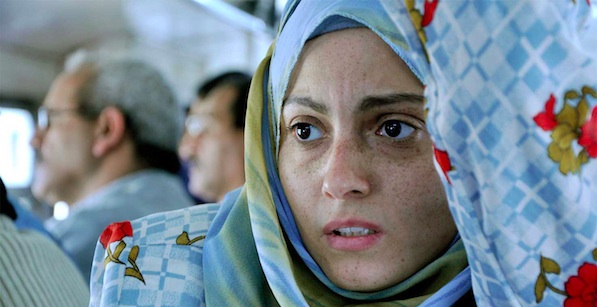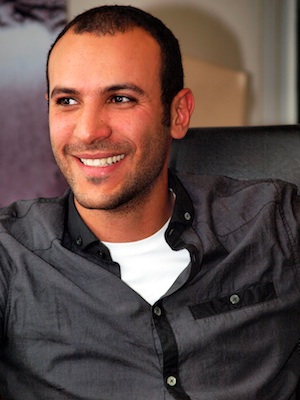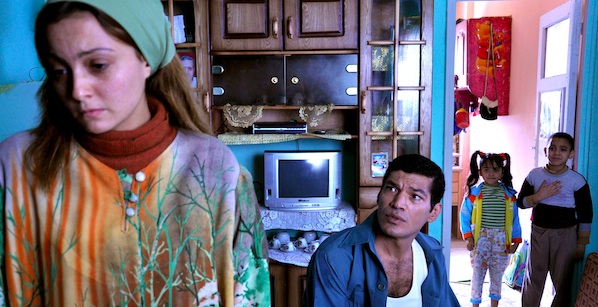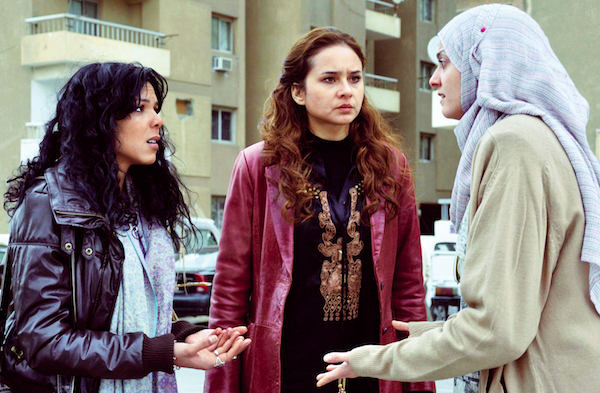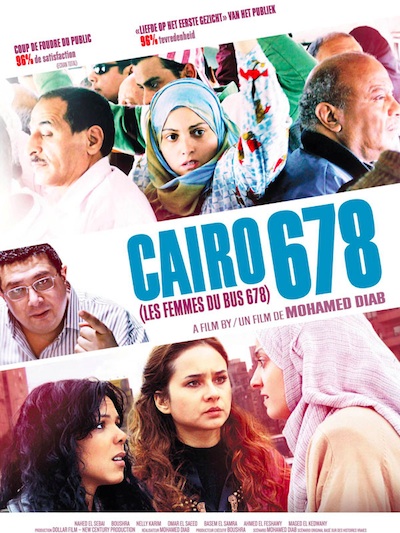Mohamed Diab had four hugely successful screenplays behind him when he decided to helm his own independent film, one that stood to make him highly unpopular in his native Egypt. In 2010, the year his Cairo 678 was released, the subject of sexual harassment was still very much a taboo in popular discourse. The first lawsuit against sexual harassment had only recently gone to court (and was, indeed, part of Diab’s inspiration). But a democratic revolution followed on its heels in 2011 that would gather unprecedented momentum behind the democratic aspirations of all Egyptians.
Cairo 678 follows three women from distinct class backgrounds as each reels from an incident of sexual assault. Their intersecting courses through Cairo’s humming metropolis eventually bring them into a shaky alliance, as they strike back against a chauvinistic society that stigmatizes their own victimhood. Shadowing them, meanwhile, is a hard-bitten and paternalistic detective investigating a peculiar series of violent crimes on the buses and streets of the city.
The film, which lightens its tough subject with moments of compassionate humor, took prizes and won acclaim at international festivals when it premiered in 2010. But back at home in Egypt (whose large and influential film industry makes it “the Hollywood of the Middle East”), Cairo 678 received a more complex and, in some cases, hostile response. This is partly owed to the taboo nature of the subject of sexual harassment (and sex generally—Egyptian filmmaker Amr Bayoumi’s documentary exposé Sex Talk, for instance, came out the same year without finding an Egyptian distributor). National sensitivity around its portrayal of Egyptian society also fed criticisms, as did nervousness about its portrayal of vigilante action by women against male aggressors.
Then came the democracy protests at Tahrir Square in January 2011, which ignited a popular revolution that brought down the regime of Hosni Mubarak. That popular nationwide uprising has since been superseded by extremist violence between the Muslim Brotherhood followers of former president Mohamed Morsi (elected in the aftermath of Mubarak’s resignation) and the military government led by General Sisi, which ousted Morsi’s government in a military coup in July. Cairo is now almost daily engulfed in violence. But Diab’s first film has since become something of a time capsule, capturing a pivotal moment just before the groundswell that toppled Hosni Mubarak’s government, when restive energies just below the surface of society pointed to a society nearing a breaking point and desperate for equality.
Mohamed Diab is in San Francisco this week for a public screening and discussion of Cairo 678, on October 10, in conjunction with his artist residency at the San Francisco Film Society. Diab sat down at the Film Society’s FilmHouse headquarters to speak about the origins of the film and its unanticipated convergence with a groundswell of democratic fervor in 2011.
Keyframe: You were a very successful screenwriter before becoming a writer-director with Cairo 678. What made you turn from mainstream films to an independent one like this?
Mohamed Diab: The last two films [I wrote] were with the biggest stars in Egypt. I made them together. I felt I had nothing to say. They were smart. They made big money. But writing them with no motive was such a hell to me. I discovered I don’t care about the money. The money is there, but I’m not having fun. I hated every moment of it. At the time, I told my wife, I just want to make something I believe in. It took me two years to make [Cairo 678]. It was very hard in the beginning to convince people that I could direct it. But it helped me that the films I had made previously were successful. So I jumped in. I heard about the harassment case. I saw her on TV, the first woman to ever file a case against a harasser. I went to the trial. And there, one of the media guys who was just shooting what was going on was telling his friends, ‘You know what, this guy, he deserves 15 years in jail.’ And they asked him why. And he said, ‘Because he didn’t pick a prettier girl.’ What films taught me is to see the good in people. So I didn’t see him as a bad person, I just saw him as someone who’s negligent, misinformed. ‘It’s just a touch, what’s the big deal?’ That’s when I felt I needed to apologize, but practically, by making a film, and showing this guy and his point of view.
Keyframe: So he was your audience, in a sense.
Diab: I had two audiences in mind: Women, showing their point of view, [to encourage them] to stand up for their rights; and men, to see that journey—to see that a small touch can change someone’s life, can make you hate your country. There’s one [character in the film] who gets harassed at a [soccer] match. She painted her face with the Egyptian flag. She’s going to cheer for the Egyptian team. And she gets brutally gang sexually harassed. Afterward, in a subtle way, she wipes the flag off her face—and it means something to me.
So that’s where I started. Because of that incident [at the harassment trial], I started interviewing women around me, just to discover that world. As an Egyptian guy, you don’t know anything about this because women never speak about it. The women in my circle would never tell me that they got harassed—my wife, my sister, my mother, would never tell me that. So how would I know? That’s why, when the film was released, it was fought, especially from the male audience.
Keyframe: The film depicts resistance among women themselves to discussing the taboo subject of harassment. Was it difficult to get the women you interviewed to talk openly about this subject?
Diab: It was very hard at the beginning. But every session, by the end of the session, it was different than at the beginning. Every single gesture from a woman in the film is actually taken from those interviews. I haven’t created anything. I could write a book out of the information that I got, and I put it all in the film.
Keyframe: Why did you feel compelled to direct this film as well?
Diab: There are a couple of reasons. As a screenwriter, you never express yourself fully. It’s a game of telephone. I say ‘hello’ and it comes out ‘goodbye.’ Sometimes ‘goodbye’ sounds better than ‘hello,’ but it’s not my ‘hello,’ you know? The people in the middle are the directors, the actors, the editor—everybody who’s involved has a say, which is something great, but it’s not necessarily what you wanted to say. When I was directing, I was still writing the film. I’d take what the actors were doing and I’d write some more. And the editing room is a new writing process. So that was one of the main reasons. Before this film, I decided either I’m going to direct my next film or I’m going to write novels. The second reason is, this particular film needed to be directed by a man. [Otherwise] it would have been [seen as] a feminist talking about a female issue. Usually men take that lightly, thinking they must be exaggerating.
Keyframe: It would have been too easy for them to dismiss it?
Diab: Exactly. I really felt obligated. Again, this was my way of apologizing for not knowing this horrendous situation they’re living under.
Keyframe: In this respect, the character of the police detective (played by Maged El Kedwany) is a pivotal male figure, because of his particular vantage on the problem and the transformation he undergoes.
Diab: I created that character because he is that reporter, that cinematographer who wasn’t caring [about the harassment case]. He is the normal Egyptian guy who really thinks that these problems are exaggerated. He’s not bad. The moment he realizes it’s real, or puts himself in their position, he changes. So to me he is the typical Egyptian guy, who’s actually good at heart.
Keyframe: Your film came out not long before the 2011 popular uprising, which saw such stirring acts of courage and solidarity among Egyptian protesters, men and women. Then came the now infamous case of CBS television journalist Lara Logan, who was sexually assaulted while reporting from Tahrir Square. What is your memory and perspective concerning that incident?
Diab: I remember I was involved in the revolution, even before it started, the week before asking people to come down. But I never dared to ask women to come down, because I have an experience when it comes to crowds. Crowds mean harassment. That’s how it is. I was shooting a scene—you remember the scene after the match. I waited for a real match, Egypt playing against Algeria, it was a big match, millions of people were in the streets. I took my crew and went down to shoot parts of the aftermath, because people were celebrating. We weren’t shooting any sexual harassment scenes. [But] what actually happened to [the actress] was gang sexual harassment, on camera. We went into that square, 50 steps in, and she got gang sexually harassed. The actor pulled her out; it took him 15 minutes. She fainted and she almost died. That showed me how crazy it is in crowds.
The people who participated in the 25th [of January 2011] were mostly upper-middle-class, utopian, idealistic people, and they were risking their lives to do that. The first big incident that happened was [CBS television correspondent] Lara Logan. That happened the moment Mubarak stepped down [on February 11]. Because when Mubarak stepped down everyone knew that there wasn’t a regime anymore. So everyone can jump in. If you were one of the people [earlier] who were risking their lives, you would definitely not think about sexually harassing anyone. Later on, we went back to the old way of thinking. Now, going to the Tahrir Square demonstrations is just like suicide. I would never encourage any woman to go there. We haven’t solved the problem. We went back to how it was. But the film opened a door a little, and the revolution threw it wide open, when it comes to breaking the silence—because now more and more women are speaking about harassment. We don’t have a solution yet, but at least we’re acknowledging it. When you see the film, you see how hard it is to speak about harassment, how scandalous it is. There’s a stigma on the victim more than on the harasser; the harasser can go brag. The victim is the one who lives in shame, which is something very crazy.
Keyframe: What have been some of the responses of filmmakers to the revolution and its aftermath? Yousry Nassrallah had a film, After the Battle, for example. Will you make a film about the revolution? How hard is it to make such a film in Egypt currently?
Diab: It’s definitely difficult, because no one goes to the cinema when there’s chaos in the street. And which part of the revolution would you cover, when it’s changing every day? Three months ago we had the revolution, now we don’t. So Yousry Nasrallah made a film. I think he was brave, but it was very hard. And when you see the film now, it’s talking idealistically about the very first stages of the revolution. A friend of mine, Ahmad Abdalla, who made Microphone [2010], just made a film that premiered at Toronto [International Film Festival, 2013] called Rags and Tatters. It’s a good film, too. It’s very subtle. I think it could last longer because it’s not talking about a particular event or anything political per se. Another friend of mine, Ibrahim El Batout—he’s very famous on the independent scene—he had a film called Winter of Discontent [2012]. I haven’t seen it yet. Mostly independent filmmakers are the ones who have covered the revolution. But most of the films about the revolution have been failing in Egypt—because you need a break. It’s been like an action sequence for three years. People are just fed up.
I finally found a film about the revolution that I want to make [based on] a story that happened last month. People were arrested and put in a big van. They kept them there, like 45 people. It was very hot. And there were so many [arrests] that the prison said it wouldn’t take anyone else. So they stayed there for like ten hours, and they suffocated. It was such a tragedy. I want to portray it with protesters from both sides in there. I want to shoot the whole film inside the car. It’s a very ambitious project, and I know for a fact that no one in Egypt is going to like it, just that five percent I told you about. I’m realistic about it. [But] in my opinion, filmmaking is about bringing people together, exploring human nature, and in the end discovering that we’re all close to each other. That’s why I’m going to try to do that film. But in Egypt right now, if you’re not with me a hundred percent, you’re against me a hundred percent. So if you gave a human face to the Islamists, the opposition is going to hate you; and on the other side, if you give a human face to the police, you’re belittling the whole crime.
Keyframe: Are you planning to direct your own films from now on?
Diab: Actually I just finished two scripts. I just sold them. Just as the screenwriter. For the past three years I was thinking; I didn’t want to rush in and just make any film. I wanted to take my time. I needed money, so I wrote those two scripts. But the one I’m thinking about making myself, I just told you about. And I just bought the rights for a story in Michigan about a [Lebanese American] woman who changes the law [around child custody] in Michigan. She has a law in her name. So I’m trying to make a film here, too.

